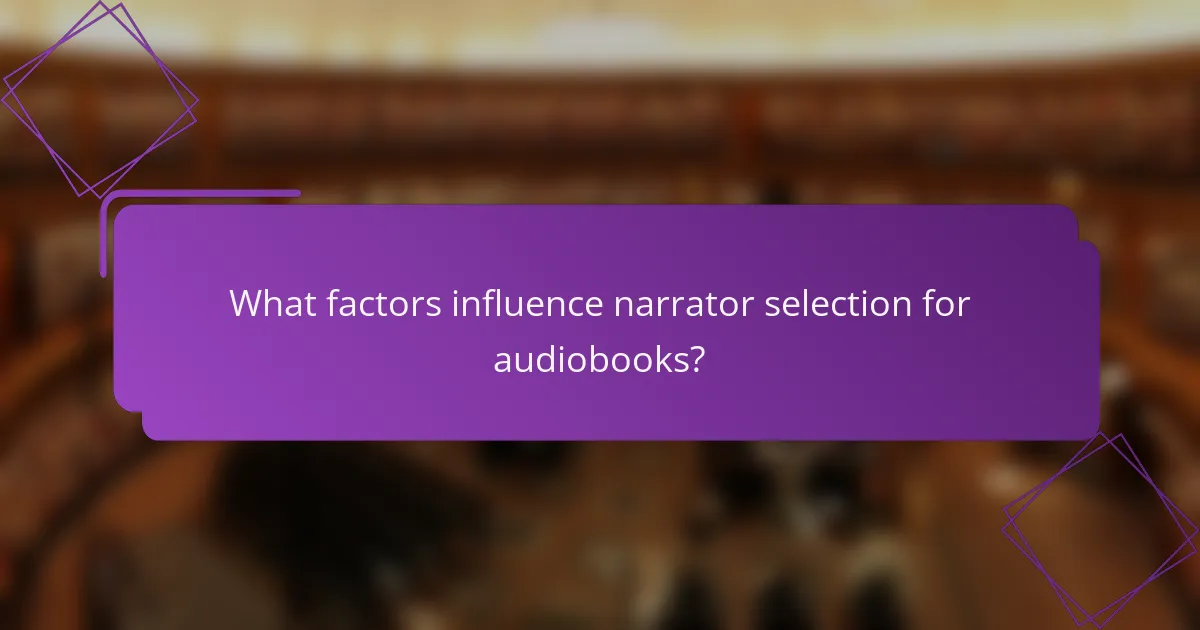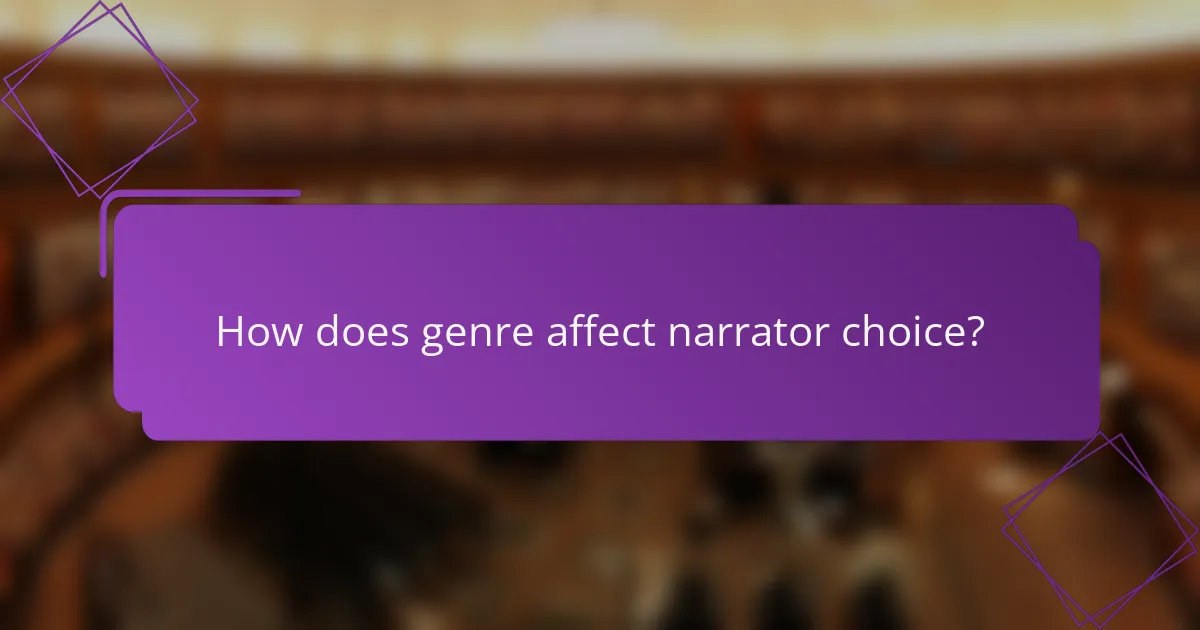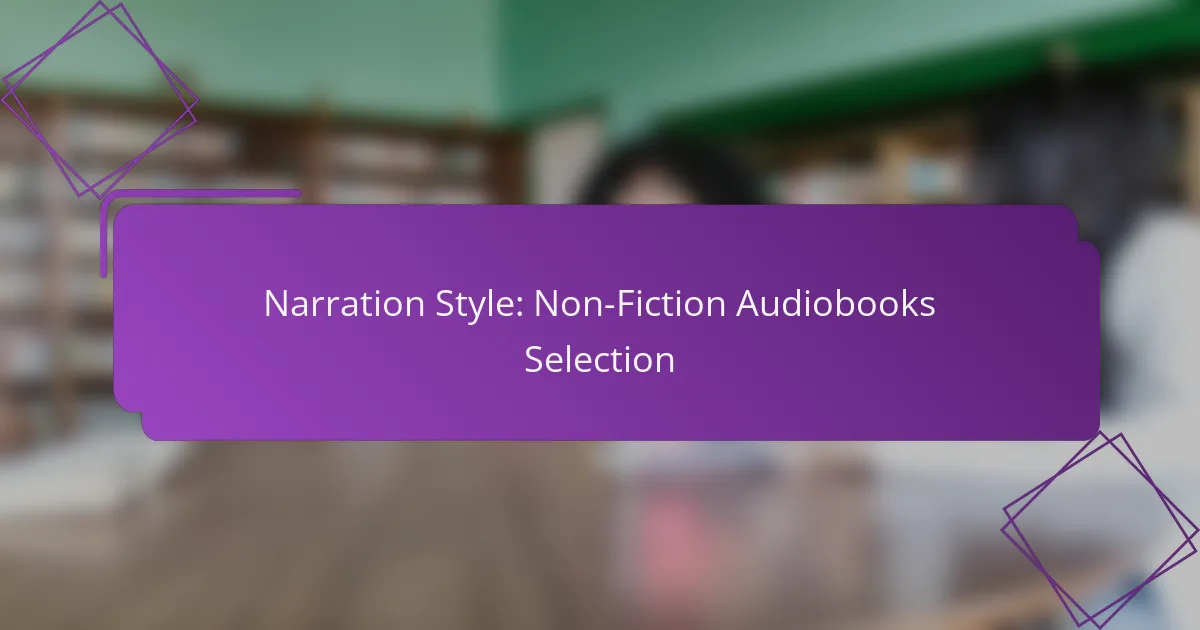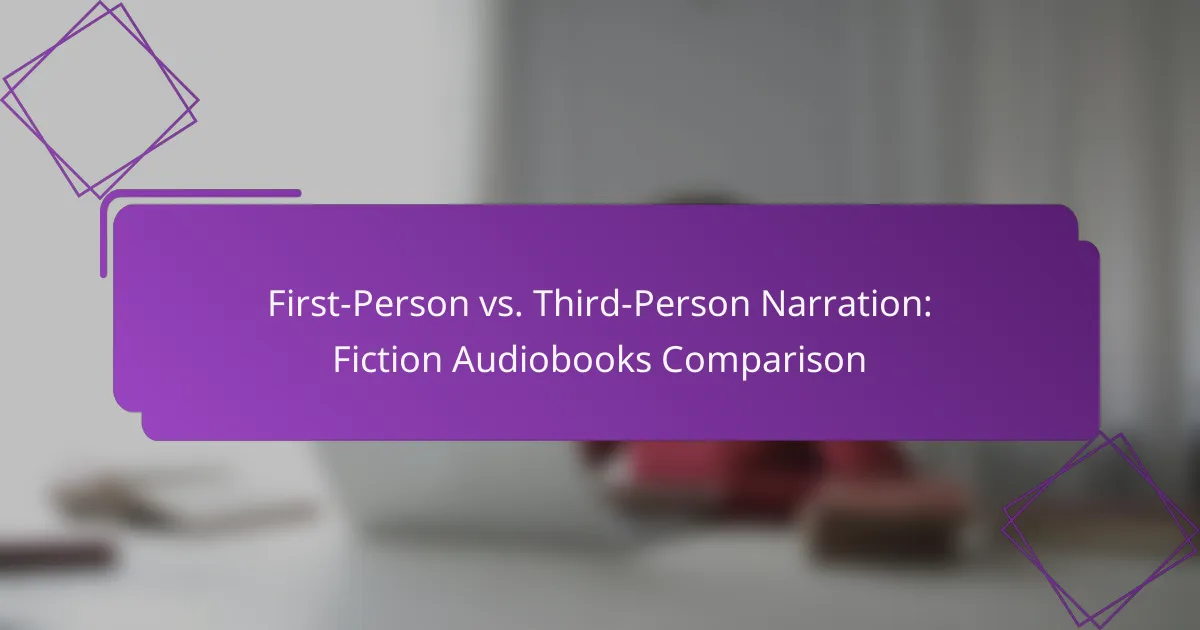Narrator selection plays a pivotal role in the success of an audiobook, as it directly impacts the listener’s experience. Factors such as genre compatibility, audience preferences, and the narrator’s voice characteristics are essential in choosing the right voice to convey the story’s essence. By understanding these considerations, producers can enhance the overall quality and resonance of the audiobook with its intended audience.

What factors influence narrator selection for audiobooks?
Narrator selection for audiobooks is influenced by several key factors, including genre compatibility, audience preferences, narrator experience, voice characteristics, and production quality. Understanding these elements can significantly enhance the listening experience and ensure that the audiobook resonates with its intended audience.
Genre compatibility
Choosing a narrator whose style aligns with the genre of the audiobook is crucial. For instance, a dramatic thriller may benefit from a narrator with a deep, intense voice, while a light-hearted romance might be better suited to a narrator with a warm, friendly tone. This alignment helps to convey the appropriate mood and engage listeners effectively.
Different genres often have specific conventions. For example, fantasy audiobooks frequently feature narrators who can bring various characters to life with distinct voices, while non-fiction may require a more straightforward, authoritative delivery. Understanding these nuances can guide effective narrator selection.
Audience preferences
Understanding the target audience’s preferences is essential in narrator selection. Listeners often have specific tastes regarding voice types, accents, and styles. Conducting surveys or analyzing reviews can provide insights into what the audience enjoys, helping to match the narrator to listener expectations.
Additionally, considering demographic factors such as age and cultural background can influence preferences. For example, younger audiences may prefer narrators who use contemporary language and relatable tones, while older listeners might appreciate a more classic or traditional approach.
Narrator experience
The experience level of a narrator can significantly impact the quality of an audiobook. Seasoned narrators often bring a wealth of skills, including pacing, emotional range, and character differentiation. Their familiarity with various genres can also enhance their performance.
When selecting a narrator, consider their previous work and listener feedback. Experienced narrators may command higher fees, but their ability to deliver a polished performance can justify the investment, especially for high-stakes projects.
Voice characteristics
Voice characteristics such as tone, pitch, and clarity play a vital role in narrator selection. A narrator’s voice should be pleasant and engaging, capable of holding the listener’s attention for extended periods. For example, a soothing voice may be ideal for meditation audiobooks, while a dynamic voice may suit action-packed narratives.
It’s also important to consider the narrator’s ability to convey emotion and character. A narrator who can effectively express joy, sadness, or tension will enhance the storytelling experience and make the content more relatable to listeners.
Production quality
High production quality is essential for a successful audiobook. This includes clear audio, appropriate sound editing, and a professional recording environment. Poor production can detract from even the best narration, leading to listener dissatisfaction.
When selecting a narrator, inquire about their recording setup and experience with audio production. Collaborating with narrators who have access to professional equipment or studios can ensure that the final product meets industry standards and provides a pleasant listening experience.

How does genre affect narrator choice?
The genre of an audiobook significantly influences the selection of the narrator, as different genres require distinct vocal styles and emotional tones. A narrator’s ability to convey the essence of the story and connect with the target audience is crucial for enhancing the listening experience.
Fiction vs. non-fiction
In fiction, narrators often need to embody various characters, requiring a versatile voice and the ability to switch tones seamlessly. This can involve using different accents or emotional inflections to bring characters to life. In contrast, non-fiction narrators typically focus on clarity and authority, presenting information in a straightforward manner without excessive dramatization.
When choosing a narrator for non-fiction, consider their expertise in the subject matter, as this can enhance credibility. For fiction, look for narrators with a strong background in character-driven storytelling.
Children’s books
Narrators for children’s books should possess a lively and engaging voice that captures the attention of young listeners. They often use playful tones and sound effects to enhance the storytelling experience. It’s essential for the narrator to connect with the age group, adapting their style to suit toddlers, early readers, or middle-grade audiences.
Consider the themes and complexity of the story when selecting a narrator. For instance, a whimsical story may benefit from a narrator who can infuse humor and excitement, while a more serious tale may require a soothing and gentle approach.
Romance novels
In romance novels, the narrator’s ability to convey emotion and chemistry between characters is paramount. A good romance narrator should have a warm, inviting tone and be adept at expressing subtle nuances in dialogue. This helps to create an immersive experience for listeners who are often invested in the characters’ relationships.
When selecting a narrator for romance, consider their experience with the genre and their ability to handle intimate scenes sensitively. A narrator who can balance passion with authenticity will resonate well with the audience.
Thriller and mystery
Narrators for thrillers and mysteries need to create suspense and tension through their vocal delivery. A strong, commanding voice can enhance the gripping nature of the story, while pacing and tone shifts can build anticipation. It’s important for the narrator to maintain a balance between clarity and intrigue, ensuring that listeners remain engaged without revealing too much too soon.
When choosing a narrator for this genre, consider their ability to portray different characters convincingly, as plot twists often rely on character perspectives. A narrator skilled in creating suspense will elevate the overall experience, keeping listeners on the edge of their seats.

What are the best practices for selecting a narrator?
Selecting a narrator is crucial for the success of an audiobook, as their voice can significantly influence the listener’s experience. Best practices include auditioning multiple candidates, listening to samples, and considering the demographics of your target audience.
Auditioning multiple narrators
Auditioning several narrators allows you to compare different styles and voices, ensuring you find the best fit for your audiobook. Aim to shortlist at least three narrators to provide a diverse range of interpretations.
During auditions, provide each narrator with the same excerpt to maintain consistency. This will help you evaluate their pacing, tone, and emotional delivery effectively.
Listening to samples
Listening to samples of a narrator’s previous work is essential for assessing their suitability. Pay attention to their articulation, character differentiation, and overall engagement with the material.
Consider requesting a short sample reading of your specific content to see how they handle your text. This can reveal their ability to convey the intended mood and style of your audiobook.
Considering listener demographics
Understanding your audience’s demographics is key to selecting a narrator who resonates with them. Factors such as age, cultural background, and preferences can influence the effectiveness of a narrator’s performance.
For example, a younger audience may prefer a narrator with a contemporary voice, while a more mature audience might appreciate a classic, authoritative tone. Tailoring your choice to your listeners can enhance their overall experience.

What are the common mistakes in narrator selection?
Common mistakes in narrator selection include failing to consider the specific nuances of the genre, ignoring listener feedback, and choosing narrators based solely on their popularity. These errors can lead to a mismatch between the narrator and the content, ultimately affecting the listener’s experience.
Ignoring genre nuances
Each audiobook genre has distinct characteristics that influence the choice of narrator. For example, a romance novel may benefit from a warm, emotive voice, while a thriller might require a more intense and suspenseful delivery. Understanding these nuances helps ensure that the narrator enhances the story rather than detracts from it.
When selecting a narrator, consider the tone, pacing, and style typical of the genre. Listening to a few samples from narrators who specialize in that genre can provide valuable insights into what works best.
Overlooking listener feedback
Listener feedback is a crucial resource that can guide narrator selection. Reviews and ratings often highlight what listeners appreciate or dislike about a narrator’s performance. Ignoring this feedback can result in a poor match that fails to resonate with the target audience.
To effectively incorporate listener feedback, monitor platforms where audiobooks are discussed, such as Goodreads or Audible. Pay attention to recurring themes in reviews, and consider conducting surveys to gather direct input from your audience.
Choosing based on popularity alone
While a popular narrator may seem like a safe choice, their style may not suit every genre or story. Relying solely on popularity can lead to a mismatch that detracts from the audiobook’s overall quality. It’s essential to evaluate how well a narrator’s voice aligns with the specific content.
To avoid this pitfall, assess the narrator’s previous work in relation to your genre. Consider their versatility and ability to adapt to different styles, rather than just their fame. This approach can lead to a more engaging listening experience for your audience.

What tools can assist in narrator selection?
Several platforms can help you select the right narrator for your audiobook, each offering unique features and benefits. These tools streamline the process by providing access to a wide range of narrators, allowing you to listen to samples and compare their styles.
ACX platform
ACX (Audiobook Creation Exchange) is a popular platform that connects authors and publishers with narrators. It allows you to post your project and receive auditions from narrators, making it easy to find a voice that fits your book’s tone.
When using ACX, consider the narrator’s experience, style, and previous work. You can listen to samples and read reviews to gauge their suitability. Keep in mind that ACX operates on a royalty share or a flat fee basis, so budget accordingly.
Findaway Voices
Findaway Voices offers a comprehensive service for audiobook production, including narrator selection. This platform allows you to browse a diverse roster of narrators and listen to their samples, helping you make an informed choice.
One advantage of Findaway Voices is its flexibility in distribution, allowing you to reach multiple audiobook retailers. Be aware of the pricing structure, as it may vary based on the narrator’s experience and the length of your audiobook.
Audible Studios
Audible Studios is known for its high-quality audiobook productions and offers a selection of professional narrators. While primarily focused on producing audiobooks for Audible, it also provides resources for authors looking to create their own audiobooks.
When considering Audible Studios, evaluate the quality of their narrators and the production standards they uphold. Their services may come at a premium, but the investment can lead to a polished final product that appeals to listeners.

How do cultural considerations impact narrator choices?
Cultural considerations significantly influence narrator selection by ensuring that the voice aligns with the story’s context and audience expectations. Factors such as accent, dialect, and cultural references can enhance authenticity and relatability for listeners.
Understanding cultural nuances
Cultural nuances encompass the subtleties of language, including idioms, expressions, and social norms that vary across different regions. A narrator who understands these elements can convey the story more effectively, making it resonate with the target audience. For instance, a British narrator may be more suitable for a novel set in London, while an American voice might better serve a story set in New York.
Choosing the right accent and dialect
The choice of accent and dialect is crucial in audiobook narration, as it can affect listener engagement. Selecting a narrator who naturally speaks the accent relevant to the story can create a more immersive experience. For example, using a Southern American accent for a story set in the Southern United States can enhance authenticity and draw in listeners familiar with that region.
Representation and inclusivity
Representation in narration is vital for inclusivity, as it allows diverse voices to be heard and appreciated. Choosing narrators from the same cultural background as the characters can provide a deeper understanding of their experiences. This practice not only enriches the narrative but also fosters a sense of belonging for listeners from those backgrounds.
Common pitfalls in narrator selection
One common pitfall is overlooking the importance of cultural context in the story. Narrators who lack familiarity with the culture may misinterpret key elements, leading to a disjointed listening experience. Additionally, relying solely on a narrator’s popularity rather than their suitability for the specific genre can detract from the overall quality of the audiobook.



